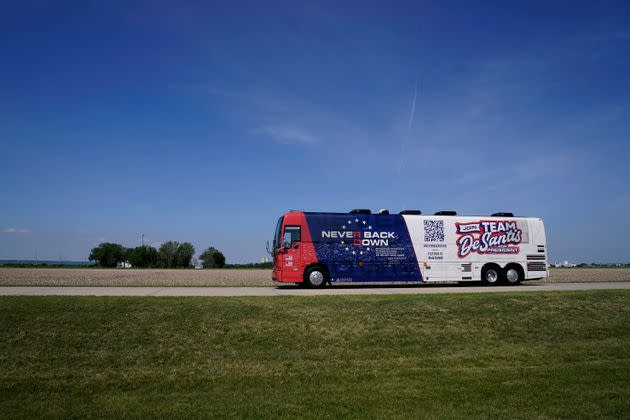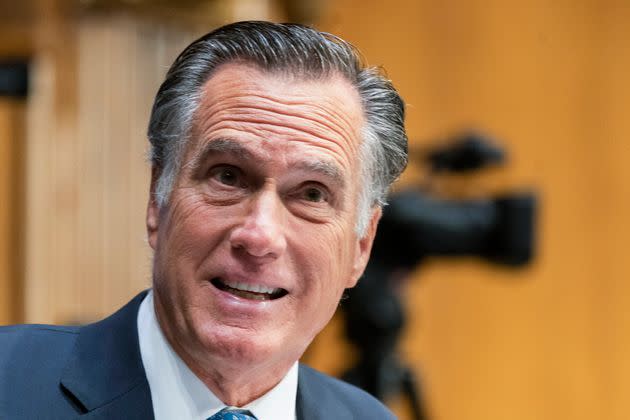Welcome To The GOP’s Billionaire Primary
- Oops!Something went wrong.Please try again later.
- Oops!Something went wrong.Please try again later.
- Oops!Something went wrong.Please try again later.
- Oops!Something went wrong.Please try again later.

Republicans are lining up megadonors to back their presidential campaigns: Oracle co-founder Larry Ellison is supporting Sen. Tim Scott (R-S.C.); hedge fund manager Ken Griffin and venture capitalist David Sacks are potentially supporting Florida Gov. Ron DeSantis; former President Donald Trump has previously had the backing of reclusive billionaire Timothy Mellon; and Mets owner Steve Cohen is reportedly backing former New Jersey Gov. Chris Christie.
The 2020 Democratic presidential primary was defined by the passions of small-dollar donors ― the mostly college-educated voters who jumped from candidate to candidate, providing Sen. Bernie Sanders (I-Vt.), Sen. Elizabeth Warren (D-Mass.) and then-South Bend, Indiana, Mayor Pete Buttigieg with momentum and cold, hard cash to power their campaigns.
But the 2024 Republican primary, which is just entering its adolescence, is set to be defined not by the passions of donors chipping in $20 in response to an email, but by millionaires and billionaires cutting checks worth tens of thousands of dollars, if not tens of millions, in response to a PowerPoint presentation and a sales pitch from a super PAC official.
The billionaire and millionaire businessmen (and they are basically all men) in New York City, Florida and elsewhere who make those donations could determine which candidate, if any, ultimately emerges as the lead challenger to former President Donald Trump ― who maintains a massive advantage in national polling, as well as in polls of the early states of Iowa, New Hampshire and South Carolina. This GOP donor class, which fears Trump is unelectable, is desperately searching for an alternative who can successfully challenge the former president.
“These campaigns are putting more emphasis on setting up their super PACs, and finding billionaires to fund them, than they are on actually running their campaigns,” said Tiffany Mueller, the CEO of End Citizens United, a Democratic group focused on campaign finance reform. “We’re seeing a race to the bottom, where billionaires are buying our elections, and it’s bad for our democracy.”
The full influence of billionaire donors, and their early bets on candidates, will be revealed over the next few days, as each candidate’s affiliated super political action committee files midyear reports with the Federal Election Commission before a July 31 deadline.
Florida Gov. Ron DeSantis, with the $80 million he raised for a state account and then transferred to the super PAC Never Back Down, was the early leader in the billionaire primary. His recent struggles ― including laying off campaign staff and sinking in polls of the early states ― have opened the door for Sen. Tim Scott (R-S.C.), who appears to be consolidating support among the Republican influencers and donors who are desperate for a non-Trump candidate to emerge.
DeSantis had assembled the fiercest collection of megadonors at the start of the campaign. Real estate magnate Robert Bigelow promised to “go without food” to fund the Florida governor’s bid. Bigelow has already reportedly donated $20 million to DeSantis’ Never Back Down.
Venture capitalist and Elon Musk whisperer David Sacks was also backing DeSantis’ bid, and could put money into groups to support him. And billionaire hedge funder Ken Griffin, one of the largest GOP super PAC donors and a man who has declared that the wealthy have an “insufficient influence” in politics, may also put money behind DeSantis in a bid to stop Trump.
But there are clear signs that DeSantis’ grasp on the donor class is slipping as his position in the polls drops. The Financial Times reported earlier this week that Griffin and another major GOP donor, 81-year-old investor Nelson Peltz, were both reconsidering their support of DeSantis.
Scott, who also has a reliable base of small-dollar donors, seems best positioned to benefit from billionaires’ wandering eyes. Politico has reported that the senator has met with Ronald Lauder, the billionaire makeup heir, and multiple GOP operatives agreed he is the candidate whom the moneyed class is most carefully eyeing at the moment.
“They see [Scott] as someone who can win both a primary and a general election,” said one GOP operative who requested anonymity to candidly describe discussions with donors.
Other Republicans have their own billionaire donors, of course. Steve Cohen, the founder of S.A.C. Capital Advisors, a hedge fund that pleaded guilty to insider trading charges in 2013, is reportedly backing New Jersey Gov. Chris Christie. Trump has long had the backing of Timothy Mellon, a businessman and heir to the Mellon banking fortune, and of Linda McMahon, who headed the Small Business Administration under Trump and is the wife of WWE impresario Vince McMahon.
Big Money Leads To Big Negativity

Never Back Down, a super PAC backing DeSantis, paid for a bus that transported the governor around Iowa in recent days. Super PACs like Never Back Down are far more likely to air negative ads than traditional campaigns.
This is quite different from the 2020 Democratic presidential primary. The Democratic candidates initially eschewed super PAC support, as primary voters frowned upon the Citizens United decision that led to the creation of super PACs, and focused instead on small-donor fundraising.
In the first fundraising quarter of 2019, eight of the 16 announced Democratic candidates had raised more than $1 million from small donors, with Sanders leading the way with $15.2 million. Seven of those eight candidates raised more than half of their funds from small donors during that early period.
The same cannot be said for the GOP candidates running for their party’s 2024 nomination. Just four candidates ― DeSantis, Scott, entrepreneur Vivek Ramaswamy and former South Carolina Gov. Nikki Haley ― reported raising more than $1 million from small donors through the end of June. (Trump likely also raised more than $1 million from small donors, but the joint fundraising committee that collects most of his money does not report until the end of July.)
And unlike the 2020 Democrats, none of the 2024 GOP hopefuls raised at least 50% of their total from small donors. Christie, who only raised $570,000 from small donors, posted the highest rate at 34%. (And many of Christie’s small donations likely came from Democrats eager to see him attack Trump on the debate stage.)
In 2020, Democrats eventually did welcome super PACs into the race, as candidates from Warren to Joe Biden got desperate enough to put their scruples aside. But the extended period without super PACs, Mueller noted, kept the primary free of the negative television ads that are often run by super PACs. (Candidates of both parties are traditionally less likely to want to say they “approved this message” at the end of attack ads.)
“The ads were just overwhelmingly positive compared to the 2016 [GOP] presidential primary,” Mueller said. “And that helps the party in the end.”
Compare it to what’s already happened in this cycle’s GOP primary: An anonymous group has attacked Trump as too friendly to transgender rights; a Trump-aligned super PAC has attacked DeSantis as a pudding-eating weirdo who wants to cut Social Security; and a DeSantis super PAC has aired an ad with an ersatz, AI-generated Trump voice.
Circular Firing Squad Redux

Sen. Mitt Romney (R-Utah) essentially created the single-candidate super PAC during his 2012 presidential run. He wrote a Wall Street Journal op-ed this week warning Republican donors to consolidate around a single candidate to defeat Trump.
Some of the biggest super PACs have already revealed their plans for the primary. Never Back Down plans to hire more than 2,500 canvassers in the early states to knock on doors for DeSantis. Trust In the Mission PAC ― or TIM PAC, get it? ― is going to spend $40 million on television ads backing Scott in Iowa, New Hampshire and South Carolina. A super PAC supporting Haley is planning an “aggressive voter contact campaign.”
Right now, all of these efforts are mostly positive. Haley and Scott, in particular, are still introducing themselves and getting voters familiar with their biographies. The fear among anti-Trump Republicans is that these well-funded super PACs will soon turn into tools for the candidates to bash each other in a fruitless quest to get the front-runner into a one-on-one matchup with Trump.
Sen. Mitt Romney (R-Utah) wrote an op-ed in The Wall Street Journal this week pleading with GOP donors not to endlessly fund no-hope candidacies.
“Republican megadonors and influencers ― large and small ― are going to have to do something they didn’t do in 2016: get candidates they support to agree to withdraw if and when their paths to the nomination are effectively closed,” Romney wrote, generously naming Feb. 26, the day after the South Carolina primary, as the date candidates should drop out.
Romney himself essentially created the modern single-candidate super PAC in 2012, using the group Restore Our Future to pummel his opponents with tens of millions of dollars in negative advertising.
But the creation may have ended up hurting him. In 2012, two of Romney’s GOP primary opponents, former House Speaker Newt Gingrich and former Pennsylvania Sen. Rick Santorum, used their own super PACs, each backed by a single billionaire donor, to extend the race. Casino magnate Sheldon Adelson funded Gingrich’s group, while financier Foster Friess backed Santorum’s. (Both billionaires have since died.) Their super PAC funding enabled Gingrich and Santorum, especially, to remain in the race long after their campaign funds started to run short.
In 2016, the super PACs kept candidates in the race, and instead of coordinating an opposition to Trump, who led the polls almost every day after his June 2015 announcement, the super PACs of the not-Trumps attacked each other in a fruitless quest to engineer a one-on-one battle. Texas Sen. Ted Cruz’s super PAC attacked then-Ohio Gov. John Kasich. Kasich’s super PAC attacked Florida Sen. Marco Rubio. Rubio’s super PAC attacked former Florida Gov. Jeb Bush. Bush’s super PAC attacked Rubio, Christie and Kasich.
That cycle could soon start again. One GOP strategist ― noticing the start of a dust-up between DeSantis and Scott, over the former’s defense of new standards regarding how the history of slavery is taught in Florida ― texted HuffPost earlier this week: “Big 2016 vibes.”
